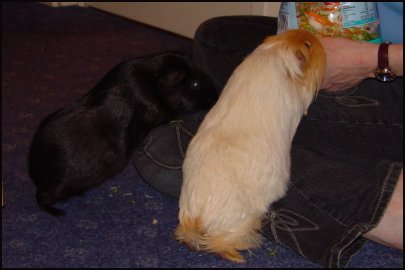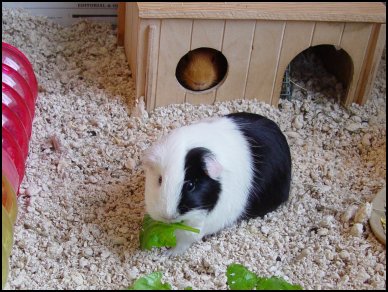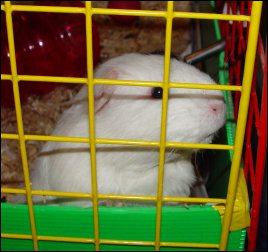Taming your Guinea Pig
Guinea Pig Crisis!!! It's that time of year and the rescues are full to bursting. If you could offer a permanent home to some lovely piggies why not take a look at The Guinea Pig Forum or Guinea Pig Rehome.
Guinea pigs can make lovely, tame pets with just a bit of time and kindness. They all have different personalities though, and whilst many piggies can be tamed to the point that they will come running over to see you when you approach, some will always prefer to sit somewhere safe. A guinea pig in the wild makes a good, hearty meal for a number of predators and as such an instinct to be scared of sudden movement and strange environments is a good survival instinct. Remember if you loom over your piggie, his instinct will tell him that an eagle is attacking and if you crash around nearby it could be a predator jumping through the undergrowth.

Me being mugged by Truffle and Angel.
A bit of time and patience can achieve a lot.
There are two main factors in taming any small animal. The first is not doing anything unpleasant to them when they are being brave, and the second is naked bribery. Because there are lots of foods that guinea pigs really like that they can have quite a bit of they are actually quite easy to tame. I use dark green salad leaves for treats, but also nice fresh grass and dandelions from the garden in the summer (don't overdo dandelions as they are diuretic). If you don't have access to a garden why not grow some nice fresh grass or greens on the window ledge!!

Charm just isn't quite brave enough to come and get fed.
Notice the nice piggie house - but watch for this window design with large pigs they can get stuck.
When you first get your guinea pigs it is best to leave them alone as much as possible for the first couple of days. It is very tempting to keep picking them up and showing them to people but this is very stressful for them when they are in a new environment so please resist this until they have settled in.
Make sure that each guinea pig has a nice house to hide in. Otherwise when they are startled the more dominant piggie will kick the other one out of the box and this can cause fights particularly amongst males. If possible don't disturb your pet when he is in his box as this will make them feel more secure. It is sometimes necessary to catch them by tipping over the box but do this as little as possible in the early days.
Feed your guinea pigs at the same time every day. They will soon learn to assoicate the sounds of feeding with something nice happening. Ours squeak when they hear rustling and/or the frige opening. Also have times a couple of times a day when you give them treats.
At first you may have to just put a treat outside the door of the nest box and move away but over time you should be able to get a guinea pig to take it from your hand. This is the most difficult part of the process and it is worth persevering. I spent a lot of time at this stage with Charm. I had to have a rule that if he didn't come and get it in a reasonable period of time I take it away again. This is because he had learnt that I would eventually give up and leave it and wouldn't take it.
Once you have a guinea pig feeding from your hand it is often quite a quick process to get them to come further and further out of the box and eventually come to the edge of the cage to be fed. Before long your guinea pig will be standing ready for a treat. It is absolutely essential that you don't use a treat to catch the guinea pig at this point as it will stop them trusting you. Once they get to trust you really well you will be able to pick them up. As mentioned above both Truffle and Smudge will come over and be picked up now.

Give me some of that apple please!
If you are interested in psycology this process is called shaping. It involves rewarding your pet when he does each small step towards what you want him to do. Or in technical speak "produces novel behaviour by reinforcing closer and closer approximations to the desired response"(Westen 2002). It also works for other animals, students, children and alledgedly husbands. Some piggies learn in a matter of days, the majority in a couple of weeks but a small minority may take a lot longer. There isn't a guinea pig out there that you can't get tamer in this way.
Guinea pigs are pets that you can sit on your lap and stroke but it can take a while for them to get used to it. A very frightened guinea pig will sit very still and even quiver. When they are a little less nervous they make a purring noise to indicate that they are unhappy - people often mistake this for the purring cats make when they are happy but it actually means the opposite.
When you first handle your guinea pig do so in a quiet room without a lot going on around. Turn off the TV and don't have the washing machine or hoover in the background. Sit them quietly and see if you can get them to eat their favorite treat - it can take a little while for them to feel safe enough to eat but if you are patient they will get happier about being handled. Make sure you always pick them up with their back end supported and don't walk around with them to start off with as the height makes them nervous. If you get them used to being handled and associate it with something nice happening (the treat) it will be easier later on when they need their toenails clipped or have to go to the vet.
If you have a long haired guinea pig be very careful not to snag her fur when you are combing her. I think that Angel's owners let her get very tangled and she became very, very nervous about being combed. I just keep her fur cut short so I don't have to put her through it anymore. She is the sandy coloured pig in the top photo and originally she looked like Dougal but used to squeal and jump when combed.
If you have indoor piggies consider making a door in their run so that they can be let out for floor time without having to be caught. This way they can let themselves in and out and will feel more secure because they can run back home if they are scared. You can then encourage them to come out with a rustling bag. This is what is happening in the top photo on this page. I have sat down and rustled a salad bag and they have come running. If you cannot let the piggies have their own door make sure that they have somewhere to hide to start off with so they can come in and it. This also applies to runs in the garden. Always give them a box to run into as you never know when the neighbour's cat might frigten them by sitting on the run.
If you take the time to slowly get your guinea pig used to you, then you will be rewarded with a happy, friendly pet. Although they won't all get to the stage where they run up and say hi when you enter the room, all guinea pigs can be taught that people are nice and present no threat and so have a much calmer, happier life. A happy pig will also get tamer quicker so have a look at the Guinea Pig Cages and Guinea Pig Toys pages.
Ours all vary in their tameness. Truffle is known as black labrador pig, as he will quite happily sit down and be picked up or scratched behind the ear. I think I would run away and hide from something before he would!! Smudge is very friendly and exceedingly vocal. It isn't possible to eat an apple in peace in our house as she'll be there looking at you making herself heard until you give her some. She will also come and be picked up, but will run away if you make her jump. Angel is reasonably tame and will come to the edge of the cage for a treat and will tolerate being scratched behind the ears sometimes. But she won't let you pick her up and will leg it if you move suddenly. Charm prefers to hide in his box when there are people about. He came to us with ringworm and had to be bathed and taken down the vet and I don't think he's ever forgiven us for it.With a great deal of time and patience I finally got him to come to the door of his box and take a treat from me and then just this week he will actually come half way out to get it. A great achievement.
Psycology Reference
Westen, Drew (2002) Psycology p180 John Wiley and Sons



